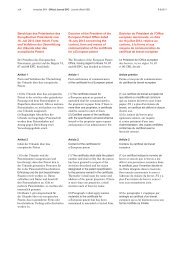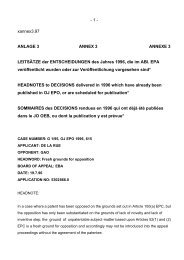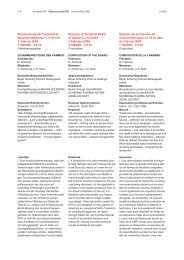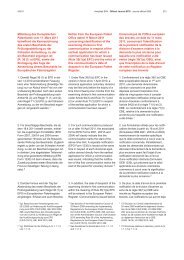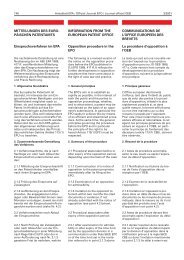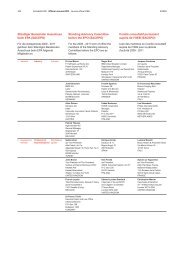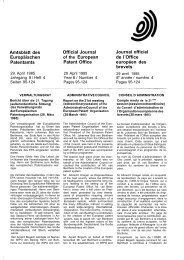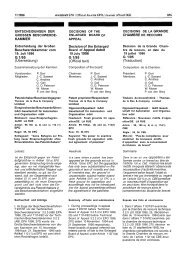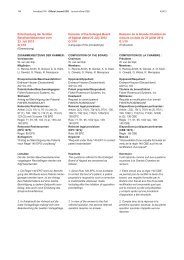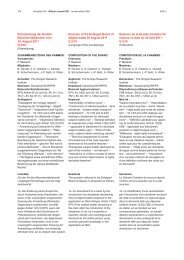Sonderausgabe 1 - European Patent Office
Sonderausgabe 1 - European Patent Office
Sonderausgabe 1 - European Patent Office
You also want an ePaper? Increase the reach of your titles
YUMPU automatically turns print PDFs into web optimized ePapers that Google loves.
74<br />
<strong>Sonderausgabe</strong> Nr. 1 ABl. EPA / Special edition No. 1 OJ EPO / Edition spéciale n° 1 JO OEB<br />
Artikel 137<br />
Formvorschriften für die Umwandlung<br />
(1) Eine europäische <strong>Patent</strong>anmeldung,<br />
die nach Artikel 135 Absatz 2 oder 3<br />
übermittelt worden ist, darf nicht Formerfordernissen<br />
des nationalen Rechts<br />
unterworfen werden, die von den im<br />
Übereinkommen vorgesehenen abweichen<br />
oder über sie hinausgehen.<br />
(2) Die Zentralbehörde für den gewerblichen<br />
Rechtsschutz, der die europäische<br />
<strong>Patent</strong>anmeldung übermittelt worden ist,<br />
kann verlangen, dass der Anmelder<br />
innerhalb einer Frist, die nicht weniger<br />
als zwei Monate betragen darf,<br />
a) die nationale Anmeldegebühr<br />
entrichtet und<br />
b) eine Übersetzung der europäischen<br />
<strong>Patent</strong>anmeldung in einer der Amtssprachen<br />
des betreffenden Staats einreicht,<br />
und zwar der ursprünglichen Fassung<br />
der Anmeldung und gegebenenfalls der<br />
im Verfahren vor dem Europäischen<br />
<strong>Patent</strong>amt geänderten Fassung, die der<br />
Anmelder dem nationalen Verfahren<br />
zugrunde zu legen wünscht.<br />
Kapitel II<br />
Nichtigkeit und ältere Rechte<br />
Artikel 138<br />
Nichtigkeit europäischer <strong>Patent</strong>e<br />
(1) Vorbehaltlich des Artikels 139 kann<br />
das europäische <strong>Patent</strong> mit Wirkung für<br />
einen Vertragsstaat nur für nichtig erklärt<br />
werden, wenn<br />
a) der Gegenstand des europäischen<br />
<strong>Patent</strong>s nach den Artikeln 52 bis 57 nicht<br />
patentierbar ist;<br />
b) das europäische <strong>Patent</strong> die Erfindung<br />
nicht so deutlich und vollständig offenbart,<br />
dass ein Fachmann sie ausführen<br />
kann;<br />
c) der Gegenstand des europäischen<br />
<strong>Patent</strong>s über den Inhalt der Anmeldung<br />
in der ursprünglich eingereichten<br />
Fassung oder, wenn das <strong>Patent</strong> auf<br />
einer Teilanmeldung oder einer nach<br />
Artikel 1 eingereichten neuen Anmeldung<br />
beruht, über den Inhalt der<br />
früheren Anmeldung in der ursprünglich<br />
eingereichten Fassung hinausgeht;<br />
d) der Schutzbereich des europäischen<br />
<strong>Patent</strong>s erweitert worden ist; oder<br />
e) der Inhaber des europäischen <strong>Patent</strong>s<br />
nicht nach Artikel 60 Absatz 1 berechtigt<br />
ist.<br />
Article 137<br />
Formal requirements for conversion<br />
(1) A <strong>European</strong> patent application transmitted<br />
in accordance with Article 135,<br />
paragraph 2 or 3, shall not be subjected<br />
to formal requirements of national law<br />
which are different from or additional to<br />
those provided for in this Convention.<br />
(2) Any central industrial property office<br />
to which the <strong>European</strong> patent application<br />
is transmitted may require that the applicant<br />
shall, within a period of not less<br />
than two months:<br />
(a) pay the national application fee; and<br />
(b) file a translation of the original text of<br />
the <strong>European</strong> patent application in an<br />
official language of the State in question<br />
and, where appropriate, of the text as<br />
amended during proceedings before the<br />
<strong>European</strong> <strong>Patent</strong> <strong>Office</strong> which the applicant<br />
wishes to use as the basis for the<br />
national procedure.<br />
Chapter II<br />
Revocation and prior rights<br />
Article 138<br />
Revocation of <strong>European</strong> patents<br />
(1) Subject to Article 139, a <strong>European</strong><br />
patent may be revoked with effect for a<br />
Contracting State only on the grounds<br />
that:<br />
(a) the subjectmatter of the <strong>European</strong><br />
patent is not patentable under Articles<br />
52 to 57;<br />
(b) the <strong>European</strong> patent does not<br />
disclose the invention in a manner sufficiently<br />
clear and complete for it to be<br />
carried out by a person skilled in the art;<br />
(c) the subject-matter of the <strong>European</strong><br />
patent extends beyond the content of<br />
the application as filed or, if the patent<br />
was granted on a divisional application<br />
or on a new application filed under<br />
Article 61, beyond the content of the<br />
earlier application as filed;<br />
(d) the protection conferred by the<br />
<strong>European</strong> patent has been extended; or<br />
(e) the proprietor of the <strong>European</strong><br />
patent is not entitled under Article 60,<br />
paragraph 1.<br />
2007<br />
Article 137<br />
Conditions de forme de la transformation<br />
(1) Une demande de brevet européen<br />
transmise conformément à l’article 135,<br />
paragraphe 2 ou 3, ne peut, quant à sa<br />
forme, être soumise par la loi nationale à<br />
des conditions différentes de celles qui<br />
sont prévues par la présente convention<br />
ou à des conditions supplémentaires.<br />
(2) Le service central de la propriété<br />
industrielle auquel la demande de brevet<br />
européen est transmise peut exiger que,<br />
dans un délai qui ne peut être inférieur à<br />
deux mois, le demandeur :<br />
a) acquitte la taxe nationale de dépôt, et<br />
b) produise, dans l’une des langues officielles<br />
de l’Etat concerné, une traduction<br />
du texte original de la demande de<br />
brevet européen ainsi que, le cas<br />
échéant, une traduction du texte modifié<br />
au cours de la procédure devant l’<strong>Office</strong><br />
européen des brevets, sur la base<br />
duquel il désire que se déroule la procédure<br />
nationale.<br />
Chapitre II<br />
Nullité et droits antérieurs<br />
Article 138<br />
Nullité des brevets européens<br />
(1) Sous réserve de l’article 139, le<br />
brevet européen ne peut être déclaré<br />
nul, avec effet pour un Etat contractant,<br />
que si :<br />
a) l’objet du brevet européen n’est pas<br />
brevetable en vertu des articles 52 à 57 ;<br />
b) le brevet européen n’expose pas<br />
l’invention de façon suffisamment claire<br />
et complète pour qu’un homme du<br />
métier puisse l’exécuter ;<br />
c) l’objet du brevet européen s’étend audelà<br />
du contenu de la demande telle<br />
qu’elle a été déposée ou, lorsque le<br />
brevet a été délivré sur la base d’une<br />
demande divisionnaire ou d’une nouvelle<br />
demande déposée en vertu de l’article<br />
61, si l’objet du brevet s’étend au-delà<br />
du contenu de la demande antérieure<br />
telle qu’elle a été déposée ;<br />
d) la protection conférée par le brevet<br />
européen a été étendue ; ou<br />
e) le titulaire du brevet européen n’avait<br />
pas le droit de l’obtenir en vertu de<br />
l’article 60, paragraphe 1.



